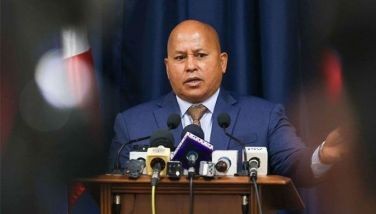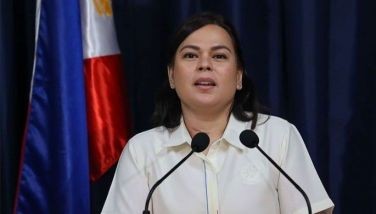Maharlika IRR lets Marcos Jr. accept, reject board nominees

MANILA, Philippines — The government yesterday released the implementing rules and regulations (IRR) of the Maharlika Investment Fund (MIF) law, which include a provision allowing President Marcos to reject the recommendation of the Maharlika Investment Corp. (MIC) advisory board on vacant posts and require the body to submit additional nominees.
A document containing the IRR has been posted on the Official Gazette, the website of the Philippine government.
Section 30 of the IRR states that the advisory board of the MIC, the vehicle for mobilizing and using the investment fund, shall submit to the Office of the President the list of nominees to vacant regular and independent director and president and chief executive officer (CEO) posts not later than 30 days from the vacancy.
The provision also states that the President “may either accept or reject the recommendation of the advisory body” and “may require the advisory body to submit additional names of nominees.”
The previous IRR of the Maharlika law merely stated that in the interest and exigency of service, vacancies in the regular and independent director seats shall be filled within 90 days from the vacancy.
The advisory body of the MIC is composed of the Department of Budget and Management and National Economic and Development Authority secretaries and the national treasurer, and is expected to provide guidance, counsel and advice to the firm’s board of directors.
In a previous speech, Marcos said he had rejected a suggestion to make him the MIC chairman to ensure that investment decisions would not be influenced by politics.
Monetary Board member and former national treasurer Rosalia de Leon said Marcos wants the board to be insulated from political influence and considerations in setting the qualifications of the MIC officers.
“The reason for removing the qualifications in the IRR is to give more independence to the board in determining the specific qualifications of the other officers of the MIC to carry out its mandate to efficiently manage the MIF,” De Leon, a member of the IRR review group, said in a statement released by the Presidential Communications Office (PCO).
“The President wants the board to be insulated from political influence and considerations, and would like to give the leeway to set the qualifications in the best way they know based on their experience and expertise in fund management,” she added.
Marcos has guaranteed that the members of the MIC would exercise independence “to give the body more latitude in managing the fund, thus promoting good corporate governance.”
Under the Maharlika law, a nine-person board of directors will govern the MIC. The finance secretary will serve as the chairperson in an ex officio capacity.
Other members of the board are the MIC president and CEO who will serve as the vice chairperson, Land Bank of the Philippines president and CEO, Development Bank of the Philippines president and CEO, two regular directors and three independent directors from the private sector.
Another revision is the removal of additional qualifications of regular and independent directors of the MIC. Under the old IRR, the additional qualifications are a master’s degree; a minimum of 10 years of experience in finance, investments, economics, business or a related field; a strong track record of making strategic decisions, driving investment performance, understanding financial markets, macroeconomic trends and geopolitical influences; identifying and mitigating investment and operational risks and ensuring prudent risk management practices and a commitment to the “highest ethical standards, integrity and compliance with relevant laws and regulations.”
There were also changes in the qualifications of the president and CEO and chief investment and operating officer (CIOO) of the MIC.
Under the previous IRR, the president and CEO must have an advanced degree in finance, economics, business administration or a related field from a reputable university.
- Latest
- Trending

























